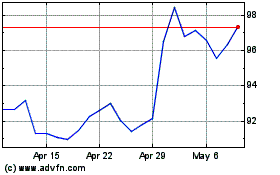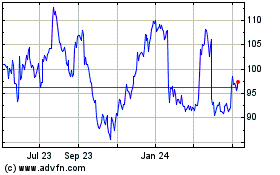By Rachael Levy and Alex Leary
President Trump invoked a Korean War-era law to help
manufacturers secure supplies needed to make ventilators and
protective face masks, as the federal stockpile of the medical
devices was running dangerously low amid the coronavirus
pandemic.
Mr. Trump used the Defense Production Act in an effort to
address the surging levels of patients in particularly hard-hit
metro areas such as New York, New Orleans and Detroit. The federal
government has distributed nearly half of its ventilators and has
fewer than 10,000 still in hand -- as the nation is projected to
need tens of thousands more in the next weeks ahead.
Governors in the hardest-hit states have been struggling to meet
the demand for ventilators. New York Gov. Andrew Cuomo, a Democrat,
said Thursday the state had only enough ventilators in its
stockpile for the next six days at the current rate of use. He said
the state would provide financing to companies who need to make
changes to begin manufacturing ventilators and other medical
supplies.
Mr. Trump said his order would help manufacturers such as
General Electric Co., Hill-Rom Holdings Inc., Medtronic PLC, ResMed
Inc, Philips NV, and Vyaire Medical "secure the supplies they need
to build ventilators needed to defeat the virus."
The White House didn't immediately respond to a request for
additional detail about the order.
Unknown is whether enough ventilators will be made available and
in time for an expected surge in the next two weeks. Mr. Trump has
said he wants manufacturers to send supplies to states and
hospitals directly, bypassing the stockpile.
The Federal Emergency Management Agency is in charge of
coordinating the federal response, including transporting supplies
to where they are needed. A FEMA spokeswoman said it wasn't known
how many ventilators FEMA expected from companies. "When we have
the numbers, we will share them," she said.
As of Monday, 7,140 ventilators had been sent out of the
Strategic National Stockpile, according to a document reviewed by
The Wall Street Journal. A FEMA spokeswoman said Wednesday in
response to questions about the stockpile that the government has
9,404 ventilators. An additional 1,065 ventilators are available
from the Defense Department, bringing the government's total number
of ventilators to 10,469, the spokeswoman said.
That number represents about one-third of the roughly 32,000
ventilators that will be required by mid-April, the expected peak
of the crisis, according to the University of Washington's
Institute for Health Metrics and Evaluation. The institute said it
didn't know how many ventilators are already available.
The government's current cache wouldn't cover what New York
state alone has projected it could require. Mr. Cuomo has said
37,000 ventilators may be needed there. The stockpile has provided
the state 4,000.
In New Jersey, Democratic Gov. Phil Murphy signed an executive
order giving state police the authority to commandeer supplies such
as ventilators from companies or other facilities to supply to
hospitals. The state estimates it needs 1,650 more ventilators in
coming weeks.
Louisiana Gov. John Bel Edwards said the New Orleans region
could run out of ventilators by next Tuesday. So far, the state has
distributed 450 ventilators since the crisis began, he said,
including 150 that came this week from the national stockpile. He
previously said he had requested 5,000 from the stockpile.
The state has been trying to procure thousands of ventilators
from all over the world, he said. "The price has at least doubled
on every ventilator that we're looking at from just where they were
three to four weeks ago," Mr. Edwards, a Democrat, said at a news
briefing Thursday.
On Wednesday, a FEMA spokeswoman said the stockpile had
distributed 8,100 ventilators as of March 28 -- a figure that is
roughly 1,000 units more than the Monday figure seen by the
Journal. The spokeswoman's figures were also dated two days
earlier. The spokeswoman said the data she provided was accurate
and that the discrepancy could be the result of human error in a
fast-moving crisis. "There's a lot of stuff flying," she said.
The Strategic National Stockpile, run by the Department of
Health and Human Services, is a collection of warehouses across the
country that hold emergency medical supplies. The locations of the
warehouses are kept secret.
On Wednesday, Mr. Trump said nearly all of the protective gear,
which doesn't include ventilators but is also needed by hospitals
to treat coronavirus patients, had been depleted from the national
stockpile. The president said companies are sending supplies,
including ventilators, directly to states and bypassing the
stockpile.
"When you make one, it doesn't get made in 15 minutes," Mr.
Trump said. "A ventilator takes time to build."
Craig Fugate, FEMA's former head, said in an interview this week
that the stockpiles "were never built, funded for a pandemic." The
government's planning assumed companies would fill in gaps by
completing large orders from the public sector, he said.
"There was so much emphasis on early indications to start that
process of ordering supplies, and if necessary turning on the DPA,"
he said.
Mr. Trump on Thursday invoked the act to force 3M Co. to
manufacture as many N-95 face masks as FEMA determines are
needed.
A separate statement accompanying Mr. Trump's earlier DPA order
on ventilator supply named General Electric Co., Hill-Rom Inc.,
Medtronic PLC, ResMed Inc., Koninklijke Philips NV, and Vyaire
Medical Inc. as among the manufacturers of the devices.
GE said it has doubled its capacity of ventilator production and
plans to double it again this quarter, and that it welcomes efforts
by the administration to help boost output. Medtronic said it
appreciated the order, and ResMed said it was pleased with the move
and encouraged auto makers, aerospace-equipment producers and other
manufacturers to help source or create more such components.
Peter Navarro, a White House adviser Mr. Trump appointed to
oversee DPA policy, said the president on Friday would sign another
order aimed at preventing some medical equipment from being
exported. "We are going to crack down unmercifully," Mr. Navarro
said.
The U.S. recently invoked the act and ordered General Motors Co.
to assemble ventilators. GM has said it would start producing
ventilators and eventually ramp up to 10,000 of the machines a
month, although only a few thousand will be made in the first
several weeks.
Ford Motor Co. said Monday it was working with GE to make 50,000
ventilators by early July at one of the auto maker's facilities in
Michigan.
A spokeswoman for HHS said the department had been working with
American companies since January to respond to the crisis "and will
continue to coordinate closely with private suppliers and our
federal partners to ensure that resources are going where they're
needed." She didn't respond to a question about the discrepancy in
ventilator figures.
As of Monday, the stockpile had distributed 11.6 million N-95
respirators, 26.4 million surgical masks, 5.3 million face shields,
4.4 million surgical gowns, 144,011 coveralls, 22.4 million gloves,
50 powered air-purifying respirators and 6,700 federal medical
station beds, according to the internal figures reviewed by the
Journal. The supplies had been sent to 63 undisclosed locations,
including one tribe, according to the document.
FEMA assumed the stockpile "alone could not fulfill all
requirements," an agency spokeswoman said.
--Scott Calvert contributed to this article.
Write to Rachael Levy at rachael.levy@wsj.com and Alex Leary at
alex.leary@wsj.com
(END) Dow Jones Newswires
April 02, 2020 19:08 ET (23:08 GMT)
Copyright (c) 2020 Dow Jones & Company, Inc.
3M (NYSE:MMM)
Historical Stock Chart
From Mar 2024 to Apr 2024

3M (NYSE:MMM)
Historical Stock Chart
From Apr 2023 to Apr 2024
